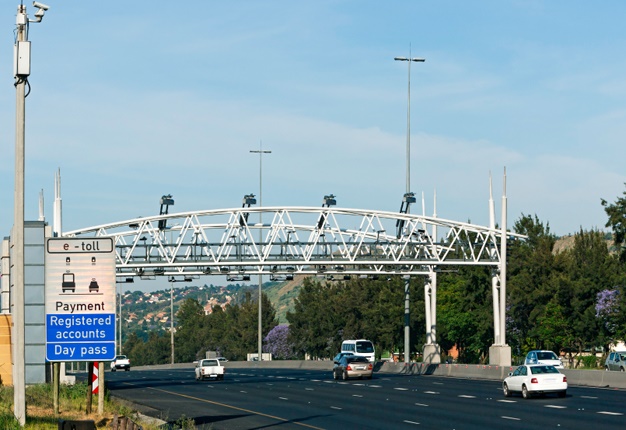
Wayne Duvenage argues that there is procrastination over the decision to scrap e-tolls as the ANC wants to capitalise on it ahead of the local government elections.
Last week's comment on the scrapping of Gauteng's e-toll system from Jacob Mamabolo, MEC for Transport, during an interview with Stephen Grootes on SAfm, was very telling.
When Grootes said in response to Mamabolo's take on the e-toll decision delay: "So the scheme has been scrapped?"; the MEC replied: "They have been scrapped..." and went on to explain why Gauteng residents shouldn't be lumbered with the burden of this unnecessary scheme.
MEC Mamabolo is a person who fills a senior position of authority in the roads and transport space and is well connected to the powers that be on the e-toll decision.
So when he says the e-toll scheme has been scrapped, he didn't just suck that position out of the air. He knows something.
'Imminent'
Now combine Mamabolo's comment with another recent mention by Minister of Transport, Fikile Mbalula on Friday 21 May, when he said after his transport budget speech that an announcement on the e-toll matter was "imminent".
The word imminent was also used by Gauteng Premier David Makhura in his State of the Province address on 25 February earlier this year, when he said that a lasting solution had been found and an announcement by the President was "imminent".
Imminent is a descriptive and concise adjective that means "likely to occur at any moment".
Stating the announcement on a decision like e-tolls is "imminent", implies that all the complicated background work of debt repayment permutations, contract cancellations, staff matters and other impacts have been contemplated and decided upon.
Furthermore, this announcement has always been that of an alternative to the status quo, i.e. certainly not about the continuation of the e-toll scheme to finance the freeway bond, as there would be no need for an announcement in that regard.
Furthermore, one can't be half pregnant on the use of the e-toll financing mechanism. You either raise all your funds through the e-toll scheme or you find an alternative. The notion of reducing the e-toll tariff to entice compliance levels is a futile one and has been attempted before.
The resistance to the scheme is a principled one. The motoring public will not pay a cent toward a scheme that doesn’t have their support or is administratively cumbersome and steeped in allegations of corruption, especially if the State has no way of enforcing payment. There has not been a single success with Sanral’s summoning of defaulting motorists, which they have abandoned since March 2019. In addition, all threats of criminal records, black-listing and vehicle license denials have been farcical hollow threats and legally challenged.
Against the backdrop of an unworkable and unenforceable scheme that barely covers the cost of administration, let alone one rand going toward the tarmac, the decision to scrap the scheme is not only a sensible one, but the only one they can pronounce on.
The question often asked is: how then does Sanral pay for the R21 billion (PIC) bond for the freeway upgrade? That's the easiest one to answer.
They continue to do what they have done for many decades, through the Treasury's annual allocation of funds to Sanral for road construction, upgrades and maintenance. When the e-toll decision was made in 2008, Sanral received around R5 billion per annum from Treasury. That figure has increased to around R15 billion per annum.
Local government elections
Furthermore, while Treasury doesn't like to ring-fence their revenue streams, they generate more than is required for their road finance allocations to Sanral and the provinces, through the most efficient user-pays fuel levy programme.
This fuel levy has increased by around 250% from R24 billion to R85 billion per annum, since the e-toll decision was made. All Sanral required was R2 billion per annum to settle the PIC Gauteng Freeway bonds. So, the money is in Treasury's coffers and has been passed on to Sanral during the schemes failure.
Furthermore, the admin costs of Treasury allocations is zero, compared to Sanral's e-toll administration plan of R1 billion plus every year.
It really isn't a difficult decision to make at all, which is why it's safe to say the decision to scrap the e-toll scheme has already been made.
Sadly, however, it's a decision the authorities have procrastinated on, and one can only put this down to one of the following reasons: political motivation to allow the ruling party to capitalise on the upcoming local elections.
Some level of corruption or payback is still being siphoned from the R50 million collected from the 15% of motorists still paying their e-toll bills each month. Sheer incompetence, probably triggered by political indecision.
Whatever the reason, just know that the e-toll scheme will be cancelled. The people have spoken and the state has no other option on this matter. The timing of the formal announcement boils down to the meaning of the word "imminent", in the minds of those in authority.
- Wayne Duvenage is the CEO of Organisation Undoing Tax Abuse (Outa).
To receive Opinions Weekly, sign up for the newsletter here. Now available to all News24 readers.
*Want to respond to the columnist? Send your letter or article to opinions@news24.com with your name and town or province. You are welcome to also send a profile picture. We encourage a diversity of voices and views in our readers' submissions and reserve the right not to publish any and all submissions received.
Disclaimer: News24 encourages freedom of speech and the expression of diverse views. The views of columnists published on News24 are therefore their own and do not necessarily represent the views of News24.
